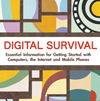Submitted by katie on Wed, 02/02/2011 - 16:11
- Don't use Internet Explorer. Internet Explorer is the most common web browser, but it has many flaws and vulnerabilities that viruses and spyware take advantage of. Instead, consider Mozilla Firefox which is recognised as being safer and more secure than Internet Explorer. It's free to download and install, and it has a number of add-ons which enhance the security and privacy of your internet browsing. You can find out more about it and download it in the Security in-a-box Hands on Guide (http://security.ngoinabox.org/firefox_main)
- Beware of Pop-Up Scams. Viruses, adware and spyware. They will trick you into thinking that you’re downloading or installing things that are good for your computer. Often when you’re surfing the web, ads will pop up on your screen, saying things like, “Your computer may have viruses – click here to protect your computer!” Sometimes these pop-ups look just like messages from Windows or another legitimate program. Don't respond to these prompts.
- Use Bookmarking! It's easy to lose track of all the great stuff you see on the web, and bookmarking is one way both to record addresses and to organise them. Every browser has a bookmark menu. If you use internet cafes, you can use a service like Delicious which will provide you with a place on the web to store your bookmarks.
- Never ever give up your account information if you have doubts about security. Although it is very helpful and easy to buy things and do your banking online, be sure to check the security of the online stores you wish to use, as well as that of any banks you may have transactions with. They should always use SSL.

